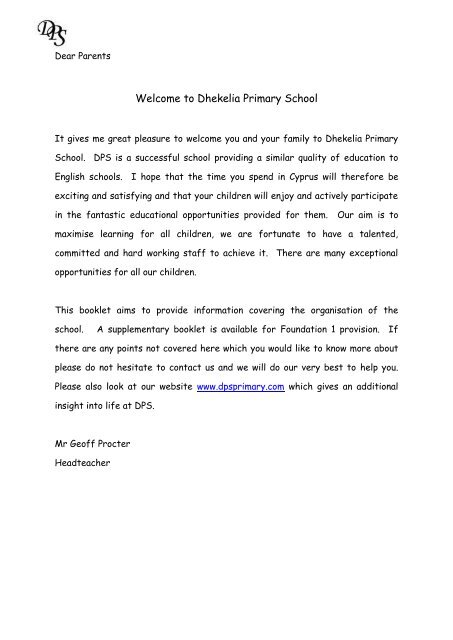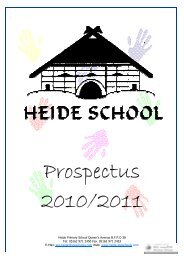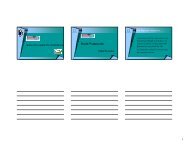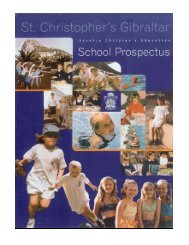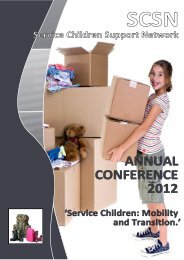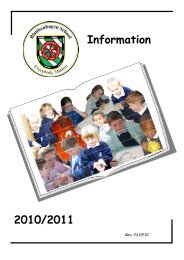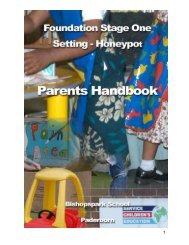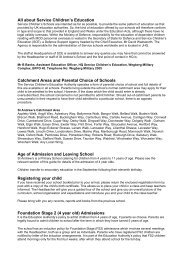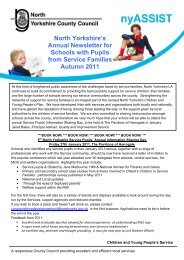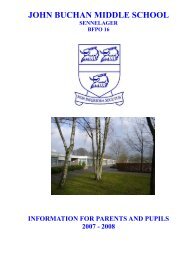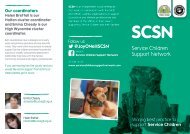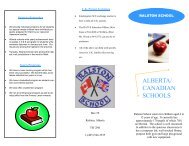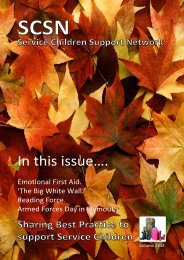Dhekelia Primary School - Service Schools Mobility Toolkit
Dhekelia Primary School - Service Schools Mobility Toolkit
Dhekelia Primary School - Service Schools Mobility Toolkit
You also want an ePaper? Increase the reach of your titles
YUMPU automatically turns print PDFs into web optimized ePapers that Google loves.
Dear Parents<br />
Welcome to <strong>Dhekelia</strong> <strong>Primary</strong> <strong>School</strong><br />
It gives me great pleasure to welcome you and your family to <strong>Dhekelia</strong> <strong>Primary</strong><br />
<strong>School</strong>. DPS is a successful school providing a similar quality of education to<br />
English schools. I hope that the time you spend in Cyprus will therefore be<br />
exciting and satisfying and that your children will enjoy and actively participate<br />
in the fantastic educational opportunities provided for them. Our aim is to<br />
maximise learning for all children, we are fortunate to have a talented,<br />
committed and hard working staff to achieve it. There are many exceptional<br />
opportunities for all our children.<br />
This booklet aims to provide information covering the organisation of the<br />
school.<br />
A supplementary booklet is available for Foundation 1 provision. If<br />
there are any points not covered here which you would like to know more about<br />
please do not hesitate to contact us and we will do our very best to help you.<br />
Please also look at our website www.dpsprimary.com which gives an additional<br />
insight into life at DPS.<br />
Mr Geoff Procter<br />
Headteacher
Contents<br />
Page No<br />
<strong>Dhekelia</strong> <strong>Primary</strong> <strong>School</strong> – school aims 3<br />
Important Information 4<br />
<strong>School</strong> Calendar 4<br />
Which class will my child be in? 5<br />
Transfer from other schools 5<br />
Getting to school 6<br />
The school dress code 7<br />
Snacks and drinks 8<br />
Personal items and toys 8<br />
Absence from school 8<br />
Health and sickness 9<br />
Problems – who you should contact 10<br />
Behaviour and rewards 10<br />
Sex education 11<br />
<strong>School</strong> assemblies 12<br />
Club activities 12<br />
Swimming 12<br />
Homework 12<br />
Charges 13<br />
The <strong>School</strong> Advisory Committee and <strong>School</strong> Council 13<br />
Time to move on! 13<br />
Fair processing notice – Data Protection Act 14<br />
Emergency Procedures 14<br />
Recent test scores for DPS 15<br />
DPS OFSTED report 16<br />
2
DPS SCHOOL AIMS<br />
<strong>Dhekelia</strong> <strong>Primary</strong> <strong>School</strong> provides all children, regardless of<br />
gender, race, ability and religion with an inclusive education<br />
aiming:<br />
To develop the whole child academically, spiritually,<br />
morally and physically, to the highest possible standards,<br />
whilst nurturing a thirst and respect for learning that will<br />
continue through life.<br />
To provide a stimulating, caring and secure environment in<br />
which all children fulfil their potentials.<br />
To provide a broad, appropriate and challenging<br />
curriculum which will equip children for life in an<br />
increasingly scientific and technological world.<br />
To develop <strong>Dhekelia</strong> <strong>Primary</strong> <strong>School</strong> as an integral part of<br />
the community, maximising local and military<br />
opportunities whilst encouraging a wider perspective and<br />
respect for the world as a whole.<br />
To integrate new children into school and within new<br />
phases in a carefully planned way, providing the maximum<br />
emotional and educational stability.<br />
To ensure that the interests of parents are taken into<br />
account through partnership, so that they are informed<br />
and encouraged to share the responsibility for the<br />
education of their child.<br />
3
Important information<br />
Postal Address<br />
<strong>Dhekelia</strong> <strong>Primary</strong> <strong>School</strong><br />
<strong>Dhekelia</strong> Garrison<br />
BFPO 58<br />
Telephone 00 357 24744288<br />
Facsimile 00 357 24744880<br />
Email<br />
sce.dhekelia@sceschools.com<br />
Website<br />
www.dpsprimary.com<br />
Headteacher<br />
<strong>School</strong>’s Advisory<br />
Committee Chairman<br />
Education Officer<br />
Mr. G.W.C Procter B A Hons Cert Ed<br />
Lt Col Pat Burns<br />
REME<br />
HQ <strong>Dhekelia</strong> Garrison<br />
BFPO 58 (2474) 4200<br />
Mr. D.M Munro B Ed<br />
Senior Assistant Education Officer (Cyprus)<br />
HQ SCE (Cyprus)<br />
Episkopi<br />
BFPO 53<br />
The <strong>School</strong> Day Registration 7.25hrs<br />
Breaks<br />
08.45-08.55hrs<br />
10.15-10.40hrs (KS1)<br />
10.15-10.40hrs (KS2)<br />
11.45-11.50hrs (KS2)<br />
End of day<br />
<strong>School</strong> Calendar – Academic Year 2010 - 2011<br />
KS1 12.30hrs<br />
KS2 13.05hrs<br />
Autumn Term 2010<br />
First day of term (non contact day) Wed 1 Sep 2010<br />
First day of term for pupils Thurs 2 Sep 2010<br />
Last day of Term Fri 17 December 2010<br />
Half-term Mon 25 to Fri 29 October 2010<br />
Spring Term 2011<br />
First day of term Tues 4 January 2011<br />
Last day of Term Friday 8 April 2011<br />
Half-term Mon 21 to Fr 25 February 2011<br />
Summer Term 2011<br />
First day of term Tues 26 April 2011<br />
Last day of Term Wed 20 July 2011<br />
Half-term Mon 30 May to Fri 3 June 2011<br />
4
Which class will my child be in?<br />
Nursery<br />
DATE OF BIRTH<br />
SCHOOL YEAR 2010 - 2011<br />
01.01.08 – 31.03.08 Join After Easter 2011<br />
01.09.07 – 31.12.07 Join After Christmas 2011<br />
01.04.07 – 31.08.07 Join in September 2010<br />
01.01.07 – 31.03.07 Already in <strong>School</strong><br />
01.09.06 – 31.12.06 Already in <strong>School</strong><br />
FS1 Timings<br />
07.25am to 10.25am<br />
<strong>Primary</strong><br />
01.09.05 – 31.08.06 FS2 Autumn 2010<br />
01.09.04 – 31.08.05 Y1 Autumn 2010<br />
01.09.03 – 31.08.04 Y2 Autumn 2010<br />
01.09.02 – 31.08.03 Y3 Autumn 2010<br />
01.09.01 – 31.08.02 Y4 Autumn 2010<br />
01.09.00 – 31.08.01 Y5 Autumn 2010<br />
01.09.99 – 31.08.00 Y6 Autumn 2010<br />
Key Stage 1 Timings<br />
07.25am to 12.30pm<br />
Key Stage 2 Timings<br />
07.25am to 13.05pm<br />
Transfer from Other <strong>School</strong>s<br />
Please contact us by phone before your arrival to arrange an admission appointment.<br />
This is normally between 8 am and 12noon. Please bring your children’s passports to the<br />
registration appointment.<br />
You can complete all paperwork, buy uniform, meet the new class teacher and have a<br />
short interview with the head teacher. Your admissions form must be stamped by your<br />
unit but normally children can start school the next school day.<br />
If your child is currently identified as having special needs on the code of school action<br />
plus or above you MUST phone CEAS on 01980 618244 to ensure appropriate provision<br />
can be made at DPS. Discussion with your child’s current school is essential prior to<br />
departure if you are unsure.<br />
Please note unless your child’s name has been changed by legal agreement the surname<br />
on the passport will be used whilst at DPS.<br />
Nursery (Foundation Stage 1)<br />
Many children will have attended the local Creche. There is close liaison between the<br />
Creche and our Foundation 1 staff. This results in a transition that is as smooth as<br />
possible. Meetings between parents and Foundation 1 staff and visits for children are<br />
part of this process. You will also receive a separate Foundation 1 booklet before the<br />
transfer.<br />
5
Entry into Reception Class (Foundation Stage 2).<br />
There is comprehensive liaison programme for the transfer of children from<br />
Foundation Stage 1 to Foundation Stage 2. When they start school in the autumn term<br />
only, children will attend school from 07.25 to 11.30 until half term. Entry may be<br />
staggered over one, two or three days according to the number of children to be<br />
admitted. Children may travel to school on the school buses in the mornings, but will<br />
need to be collected by parents or carers at 11.30. Full time provision begins after the<br />
autumn half term.<br />
Settling In<br />
Most children settle in at DPS extremely well. The children at school are very<br />
supportive of new pupils and enjoy making them feel at home. Each new child will be<br />
allocated a special friend whose task is to support your child during their first day at<br />
school. It is recommended that you arrange an interview with your child’s class teacher<br />
after a two-three week settling in period to find out how well your child has settled in<br />
and to discuss any points that may have arisen. This should be arranged directly with<br />
your child’s class teacher.<br />
Getting to <strong>School</strong><br />
By <strong>School</strong> Bus<br />
English speaking, Greek Cypriot bus escorts supervise the children.<br />
Parents of KS1 children are responsible for their children until they board the<br />
bus in the mornings and when meeting them from the bus stop after school.<br />
KS1 children must always be escorted to and from the bus stop. (Garrison<br />
orders dictate this.)<br />
Children who are unruly or rude when travelling on the buses will be reported to<br />
the Station staff Officer through Mrs Koula Andronikou, the Bus<br />
Administrator. She can be contacted on 99 856361. Parents who have any<br />
query at all should also contact Mrs Andronikou. If their behaviour persists a<br />
written warning will be given, finally the privilege of using the bus will be<br />
withdrawn. Parents will then be responsible for transporting their children to<br />
and from school. Parents also have the responsibility to pay for any damage<br />
caused by their children whilst on the bus.<br />
<strong>School</strong> buses are provided by <strong>Dhekelia</strong> Garrison to whom individual problems may<br />
be referred to again through Mrs Andronikou.<br />
Unfortunately bussing is only offered to entitled children.<br />
Each bus is given a number to identify the route it travels.<br />
No bussing is provided for Foundation 1 children.<br />
Walking to <strong>School</strong><br />
If you live in Belmont village or Normandy Road then your child will walk to<br />
school. Children should not arrive at school before 7.15 hours, when supervision<br />
begins.<br />
6
Bikes<br />
Bikes can be ridden to school by Key Stage 2 children only if a written<br />
permission form is sent to school (obtainable from the office). They must not<br />
be ridden in the school car park. Please note that they are ridden and stored in<br />
school completely at your child’s own risk. Children are expected to wear<br />
helmets.<br />
It is very important to notify the school if your child’s travelling arrangements<br />
change for any reason. The <strong>School</strong> Secretary can be contacted by phone or<br />
letter. If no such notification is received from you then your child will be sent<br />
home by the usual route. This is a rule made in the best interest of your child’s<br />
welfare.<br />
The <strong>School</strong> Dress Code<br />
The school’s policy is that the children are to wear a simple school uniform. All items<br />
of school uniform can be purchased from the <strong>School</strong> Shop in the Admin Office. <strong>School</strong><br />
uniform in Foundation 1 is optional.<br />
Labelling Clothing<br />
It is most important to mark all your child’s clothes, even their underwear and<br />
socks, with their name. This saves both teacher and child a lot of time that could<br />
be wasted searching for lost clothing. Currently there are over 60 items (unnamed)<br />
in the lost property box!<br />
<strong>School</strong> Caps<br />
Caps are compulsory in the summer months and are to be worn at every break time.<br />
The <strong>School</strong> policy is ‘NO HAT, NO PLAY’ during the summer months when there is<br />
danger of burning.<br />
Footwear<br />
Trainers, low heeled shoes and sandals with a heel strap are all permitted.<br />
PE Kit<br />
All children must have a change of clothing for P.E. The school shop sells the DPS PE<br />
kit. Children who forget their kit will be requested to change into clean, spare,<br />
clothing.<br />
Book Bag<br />
All children should have a separate book bag to transport their reading and library<br />
books safely to and from school. This is to help avoid damage to books. Book bags<br />
from previous schools are quite acceptable.<br />
Jewellery<br />
Stud earrings only are permitted in school.<br />
Lost Property<br />
7
A basket of lost property is located in the Medical Room. Unclaimed items are<br />
disposed of at the end of each term. Should your child lose an item of clothing please<br />
inform us as soon as possible as this will enhance your chance of finding it.<br />
Swimming Kit<br />
Girls will require a one-piece swimming costume; boys swimming trunks (not Bermuda<br />
shorts). Children must also bring a towel and should wear waterproof suntan cream.<br />
Earrings must be removed for swimming.<br />
Snacks and drinks<br />
All children have either two or three breaks, during the school day. Please ensure they<br />
bring in snacks to sustain them during the school day. Common sense dictates that<br />
chocolate is not suitable in the warm Cyprus climate! Water is always available from<br />
drinking fountains around the school although your child may also wish to bring in a<br />
carton of drink, no glass bottles or cans please. Children should always be encouraged<br />
to drink plenty of liquid, especially during the hot summer months. No sweets should be<br />
brought to school. Children can bring a water bottle for the classroom. It must be<br />
named and have a sports style mouth piece. They should be refilled at home daily. A<br />
healthy juice bar runs every Friday for KS1 and KS2 children. Drinks are 1 Euro each,<br />
they are 100% fruit juice and all profits go to the school council.<br />
KS1 and Foundation children are offered free fruit each day.<br />
Personal Items and Toys<br />
Mobile phones, electronic games or music players are not permitted or necessary in<br />
school.<br />
No toys should be brought to school unless a teacher has requested them as part of a<br />
programme of study.<br />
Absence from <strong>School</strong><br />
There is no doubt that children who are taken out of school suffer educationally.<br />
S.C.E. has a clear policy. Here are the key points.<br />
All parents must request for leave of absence from the Headteacher, using<br />
form S.C.E. 3.5 available from the school secretary or from the school website.<br />
The head teacher can grant a MAXIMUM OF 10 DAYS leave of absence per<br />
year for holiday reasons.<br />
Parents should only take their children away from school if circumstances force<br />
them to do so.<br />
Under exceptional circumstances i.e. after a tour of duty out of theatre, which<br />
has lasted for at least six months, an additional 10 days may be granted.<br />
If a family takes a child away from school without permission or for over the 10 day<br />
period the school will inform the Unit Families Officer, Garrison Social Worker and<br />
SAEO(Cyprus). The absence will be recorded as unauthorised.<br />
8
Daily Absence From <strong>School</strong> Due to Illness, etc.<br />
Please either (on the first day of absence)<br />
Telephone the school that day to report the absence (24 74 4288)<br />
Text us on ( 99201459)<br />
Email us dhekelia@cytanet.com.cy<br />
Send a note to school with another child.<br />
Send a note to school with the bus escort.<br />
You will then not need to send a note when the child returns to school. If we do not<br />
receive notification your child will be reported as having an unauthorised absence. This<br />
information will appear on the end of year report.<br />
As you can imagine keeping track of more than 250 children is not an easy task. We<br />
can only achieve this with your help and co-operation. Thank you.<br />
Lateness<br />
If your child is to arrive late in school, please telephone and let us know or send a note<br />
in with your child.<br />
All children arriving late MUST report to the Secretary’s Office. If they do not<br />
do so we will have no official record that the child is in school. We must have<br />
this for buses and emergencies and to ensure the absence is not recorded as<br />
unauthorised.<br />
MRS and Dental Appointments<br />
If advance notice of an appointment is given, pupils may be collected directly from the<br />
classroom. We regret that it is not possible for any child to be released from school<br />
unaccompanied. Please notify the <strong>School</strong> Secretary when your child is collected and<br />
returned to school and sign the book in her office.<br />
Work For Children Who Are Absent From <strong>School</strong>.<br />
If a parent chooses to take a child away during term time then the teacher will not<br />
supply work for the child. The only exceptions to this are:<br />
Children who have to go back to the UK on compassionate grounds.<br />
<br />
Children who are away from school because of illness or hospitalisation.<br />
We recommend for all other situations that you buy a couple of the support booklets<br />
readily available from CESSAC etc., for your child’s age.<br />
Health - Sickness<br />
Children with any signs of sickness should not be sent to school. If a child becomes ill<br />
or has an accident during the school day, parents will be contacted by telephone. If we<br />
cannot contact you and medical help appears to be necessary, we will arrange for your<br />
child to be taken to the Medical Centre by a member of staff for examination and<br />
possible treatment. It is essential that parents keep the <strong>School</strong> Secretary informed<br />
of the up-to-date contact telephone number and any change of address.<br />
9
Medicines<br />
Staff are unable to administer medicines to children except by arrangement with the<br />
head teacher. A letter of confirmation that your child is required to take medicine<br />
during school hours will be required from the child’s doctor. This should also detail<br />
dosage. The school is under no compulsion to give medicine. It reserves the right to do<br />
so.<br />
Problems and Who You Should Contact<br />
If you are worried about anything, please do not hesitate to talk it over with somebody<br />
at school. If we do not know about a problem then we cannot put it right. It should<br />
always be possible to find a solution without going through formal procedures.<br />
IF<br />
HOW?<br />
IF<br />
HOW?<br />
it is a problem within the class first contact your child’s class teacher.<br />
Telephone or write to the <strong>School</strong> Secretary, explain the nature of the<br />
problem and she will arrange an appointment. Within 24 hours of a<br />
complaint being received we will give an acknowledgement that your<br />
concerns have been registered and are being looked into.<br />
the problem is serious and needs urgent attention or you do not wish to<br />
discuss it with the <strong>School</strong> Secretary, then you may ask to speak directly<br />
to the Headteacher.<br />
Telephone or write directly to the Headteacher<br />
The SAEO or Chairman of the Governors can be contacted if all else fails.<br />
Behaviour and Rewards<br />
To assist us to do this the school has devised a system of golden rules. These rules<br />
were created by a working party, which included teachers, non-teaching staff, parents<br />
and children. The Golden rules are:<br />
Listen carefully and follow instructions.<br />
Co-operate and share with each other.<br />
Be polite, kind and truthful<br />
Look after each other’s property.<br />
Understand that it is all right to make mistakes.<br />
All classes are also involved in earning tokens for keeping the Golden Rules. More<br />
information on the Golden Rules can be found in the Policy for Personal, Social and<br />
Health Education.<br />
Playtime behaviour is monitored. Children are given amber cards as a warning of<br />
behaviour, red to indicate a loss of playtime and a green for good behaviour. At the<br />
end of the week children are awarded or counselled for their behaviour cards.<br />
10
The Cessac Award Scheme.<br />
Some awards are given for short term targets and achievements and some are over a<br />
longer period of time. The scheme encourages the age groups in differing ways. Please<br />
refer to the <strong>School</strong> Positive Behaviour policy for more detail.<br />
Year 1 and Year Two<br />
Rewards of stars or stickers are given to children individually and collected on a<br />
class incentive chart. A reward might be given for good work, effort, tidying and<br />
caring for others, etc. There is a read for a star scheme.<br />
Years Three and Four<br />
These groups have a merit system. Individual merits are given for good work,<br />
regular completion of homework, helpfulness, outstanding achievement, etc. When a<br />
child receives a certain numbers of merits they are individually rewarded with<br />
certificates, badges and bugs. The merit system restarts at the beginning of each<br />
term, giving the children the chance to earn rewards in each term.<br />
Years Five and Six<br />
In addition to a more challenging merit system, the older children receive rewards<br />
for completing certain tasks such as craft work, achievements in sports or hobbies<br />
or extra curricular activities, or other involvement in the community.<br />
Sex Education<br />
This is an integral part of Science and Personal & Social Education. The school policy on<br />
sex education has been formulated in conjunction with the <strong>School</strong> Advisory Committee<br />
who have approved its content. It is taught within the context of a project to Year Six<br />
children. A teacher with pastoral responsibility for the Year Six children will be<br />
involved with the teaching of the unit. A sex education videos used which places the<br />
theme within the context of loving family relationships. The videos are available from<br />
the school for parents to watch. Support materials in the form of pamphlets for<br />
parents who may find difficulty in discussing these issues are also available from the<br />
school.<br />
Teachers of younger children will discuss issues sensitively, in a manner appropriate to<br />
the age range as and when they arise in the classroom.<br />
<strong>School</strong> Assemblies – Reflection, Celebration, Praise and Prayer<br />
The daily school assembly is an important part of life in school. The head teacher,<br />
members of the teaching staff and padres are involved in the school assemblies. There<br />
is a whole school assembly once a week. Other assemblies take place within year groups<br />
or key stages. Padre frequently takes assemblies.<br />
Parents have a right to withdraw their child from all or part of any act of collective<br />
worship and Religious Education. If you wish to exercise this right please contact the<br />
11
head teacher. Alternative arrangements will be made for your child during this period.<br />
This usually involves continuing his/her work during this period.<br />
Club Activities<br />
A range of activities is provided for children throughout the year. Club activities are<br />
only available to children in KS2 and they take place after school hours. No transport<br />
is available so parents must arrange to collect their children. Notification of activities<br />
available each term will be through the school newsletter.<br />
Swimming (for Key Stage Two and Year Two)<br />
During the summer months the school takes full advantage of the garrison swimming<br />
pool. The emphasis is first on teaching children to swim and second on improving their<br />
strokes. Parental help is often sought to assist with the swimming programme. Please<br />
contact the school if you can give assistance.<br />
Homework<br />
DPS gives homework in line with governments recommendations. Homework for each<br />
year group is outlined in your termly newsletter from your class teacher.<br />
Foundation 1<br />
No homework is given to Foundation 1 children.<br />
Foundation 2<br />
Reading – please spend 10 to 15 minutes, two or three times a week sharing and<br />
discussing your child’s book.<br />
Letter and number work – this is sent home as and when required. There is always an<br />
accompanying explanatory letter for parents when it is sent.<br />
Year 1 & 2<br />
Reading – Please spend 10 to 15 minutes sharing and hearing your child’s reading three<br />
times a week.<br />
Key words and/or spelling are sent home weekly.<br />
Year 3 & 4<br />
Reading – please spend 10 to 15 minutes sharing and hearing your child’s reading.<br />
Literacy (including some spelling activities) and numeracy, one activity each per week.<br />
Year 5 & 6<br />
As year 3 and 4. Year 6 children receive revision exercises in preparation for their<br />
SAT tests.<br />
The Grapevine is sent home with your child every Friday with information about<br />
events, trips and other items of interest. Please contact the school office if<br />
you do not receive it.<br />
The school has a number of support booklets available in the Admin Office.<br />
12
Should parents wish to access any aspects of school policy documentation or<br />
reports on the work of the school please contact the Head Teacher.<br />
Charges<br />
The SCE policy on charging for school activities is that the education provided by its<br />
schools for its children and in school time as far as possible will be free. However some<br />
activities, in or out of school time will only be possible if the cost can be met by<br />
voluntary contributions from parents and other sources. You may be asked to make a<br />
voluntary contribution for your child to take part in an activity, in or outside the school,<br />
such as a visiting theatre group or a trip to a place of interest.<br />
All children have access to the school library. However, if school library books are lost<br />
or damaged then they are charged at replacement cost to parents.<br />
The <strong>School</strong> Governance and <strong>School</strong> Council<br />
The 1980 Education Act made the appointment of parent governors a statutory<br />
requirement in England and Wales. Although governing bodies, as they exist in the UK<br />
were not considered appropriate for <strong>Service</strong> Children’s <strong>School</strong>s it was felt that schools<br />
should have an advisory committee.<br />
The main function of the advisory committee is to provide a forum for communication<br />
on a wide range of topics between the <strong>Service</strong> community and parents, and the head<br />
teacher and staff.<br />
The advisory committee meets at least once a term.<br />
members is held within the office.<br />
A list of the current SGC<br />
Each class from Year 2 upwards elects a boy and girl councillor. These children<br />
represent their class at half-termly council meetings, which are also attended by two<br />
parents. Decisions are made to improve school life from a child’s point of view.<br />
Time to Move On!<br />
Transfer to Other <strong>School</strong>s<br />
Please try to inform the school as soon as possible when a posting is known. We will<br />
then send you a leaving form to complete.<br />
On the last day of school you will be asked to call at the Admin Office to collect an<br />
envelope containing vital information for your child’s next school.<br />
This envelope should remain with you and not be packed as MFO as it is imperative that<br />
the receiving school gains this information as soon as possible to ensure continuity of<br />
education for the child. The envelope should be handed to the Head Teacher of the<br />
next school when you go to register your child. None of the documents are confidential<br />
and all can be read by the parents.<br />
13
Transfer to King Richard <strong>School</strong><br />
Transfer from primary to secondary school can be a worrying prospect for some<br />
children. In order to make the transfer as easy as possible, close links have been<br />
established with King Richard <strong>School</strong>.<br />
The year six induction takes place over two full days. The year six children are<br />
introduced to their new form teachers and attend a timetable of lessons that allow<br />
them to sample all the subjects and familiarise themselves with the school layout and<br />
structure.<br />
In addition parents are invited to King Richard <strong>School</strong> during the summer term to meet<br />
the Head Teacher and teaching staff. <strong>School</strong> records are passed directly to KRS by<br />
DPS.<br />
Fair processing notice for parents – DATA PROTECTION ACT<br />
<strong>School</strong>s hold information on pupils in order to run the education system, and in doing so<br />
have to follow the Data Protection Act 1998. This means, among other things, that the<br />
data held about pupils must only be used for specific purposes allowed by law. We are<br />
therefore writing to tell you about the types of data held, and to whom it may be<br />
passed on.<br />
The school holds information on pupils in order to support their teaching and learning,<br />
to monitor and report on their progress, to provide appropriate pastoral care, and to<br />
assess how well the school as whole is doing. This information includes contact details,<br />
National Curriculum assessment results (where appropriate), attendance information,<br />
characteristics such as ethnic group, special educational needs and any relevant medical<br />
information.<br />
In order to administer the National curriculum tests we are required to pass on some<br />
of this data to Qualifications and Curriculum Authority (QCA) which is responsible for<br />
the National Curriculum and associated assessment arrangements.<br />
QCA uses information about pupils to administer the National Curriculum tests and<br />
assessments for Key Stages 1 to 3. The results of these are passed on to DFES in<br />
order to compile statistics on trends and patterns in levels of achievement. The QCA<br />
uses information to evaluate the effectiveness of the National Curriculum and the<br />
associated assessment arrangements, and to ensure that these are continually<br />
improved.<br />
Pupils, as data subjects, have certain rights under Data Protection Act, including a<br />
general right of access to personal data held on them, with parents exercising this<br />
right on their behalf if they are too young to do so themselves. If you wish to access<br />
the personal data held about your child, this can be done through a subject access<br />
request. This is a formal procedure, which is started in the first instance by<br />
contacting the school. If you believe QCA holds personal data then the data protection<br />
officer for these organisations should be contacted to initiate a subject access<br />
request process.<br />
14
Emergency Procedure<br />
In the event of a fire or major incident, all children will be sent to the hockey pitch<br />
area and supervised until notice to collect from school for parents has been given.<br />
Recent SAT’s Test Scores & Teacher Assessments for DPS<br />
Key Stage 1<br />
TEACHER ASSESSMENT<br />
Percentage at each level<br />
3 or Disapplied Absent<br />
W 1 2 2C 2B 2A above children children<br />
Speaking and listening * 0 25 55 20 0 0<br />
Reading 0 15 10 35 10 30 0 0<br />
Writing 0 30 25 5 30 10 0 0<br />
Mathematics 0 15 25 25 15 20 0 0<br />
Science * 0 40 45 15 0<br />
W represents children who are working towards level 1, but have not yet achieved the standards needed for level 1.<br />
* results for Speaking and Listening and Science are based on teacher assessment only.<br />
Key Stage 2<br />
TEACHER ASSESSMENT<br />
Percentage at each level<br />
W 1 2 3 4 5 6 Pupils Pupils<br />
disapplied<br />
English 0 0 0 14 64 23 0 0 0<br />
Speaking and listening 0 0 0 18 82 0 0 0 0<br />
Reading 0 0 0 9 50 41 0 0 0<br />
Writing 0 0 0 14 64 23 0 0 0<br />
Mathematics 0 0 0 14 55 23 9 0 0<br />
Science 0 0 0 5 64 32 0 0 0<br />
TEST RESULTS<br />
Percentage at each level<br />
Below level 3* 3 4 5<br />
English 0 18 64 18 0 0<br />
Reading 0 14 36 50 0 0<br />
Writing 0 55 36 9 0 0<br />
Mathematics 0 18 64 18 0 0<br />
Science 0 18 50 32 0 0<br />
Pupils<br />
absent<br />
Pupils<br />
absent<br />
W represents pupils who are working towards level 1, but have not yet achieved the standards needed for level 1.<br />
* represents pupils who were not entered for the tests because they were working below level 3 in English,<br />
Mathematics or Science; pupils awarded a compensatory level from the tests; and pupils entered for but not<br />
achieving a level from the tests.<br />
# pupils working at the levels of the tests, but unable to access them.<br />
15
Inspection report: <strong>Dhekelia</strong> <strong>Primary</strong> <strong>School</strong>, 20–22 May 2008 12 of 12<br />
Annex B<br />
1 June 2008<br />
Dear Pupils<br />
Inspection of <strong>Dhekelia</strong> <strong>Primary</strong> <strong>School</strong>, Cyprus<br />
Thank you for the warm welcome you gave us when we visited your school. You<br />
were very friendly, polite and enthusiastic about what you do. You are clearly very<br />
happy at <strong>Dhekelia</strong> and proud of your school. You told us many interesting things<br />
that<br />
helped us. We spent a lot of time finding out how you get on in your lessons,<br />
looking<br />
at your work and talking to your teachers. We think that <strong>Dhekelia</strong> is a good<br />
school.<br />
Here are some of the things we particularly noticed:<br />
. you are making good progress during the time you spend at school because of<br />
good teaching<br />
. the exciting way you are allowed to explore your surroundings and learn about<br />
life on the island<br />
. the way the headteacher and all staff take care of you and give you help and<br />
advice to improve is excellent<br />
. your behaviour is generally good both in lessons and at playtimes<br />
. the school is well led and managed by your headteacher and staff<br />
. children in the Foundation Stage get off to a good start.<br />
We have asked your headteacher to:<br />
. make sure that you get the chance to complete more work during lessons<br />
. to tell you more about life in Britain and how it is made up of people from<br />
different cultures.<br />
It was good to meet you all and we wish you every success for the future.<br />
Yours sincerely<br />
James Kilner<br />
Her Majesty’s Inspector<br />
16


